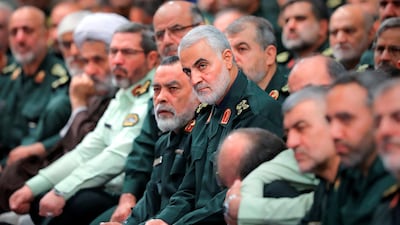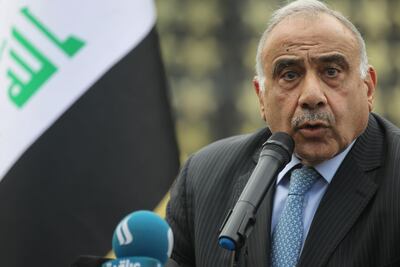Iran runs a shadow government in Iraq, which is "no secret" to the public, officials in Baghdad told The National, as leaked intelligence reports detailing how Tehran holds sway over its neighbour were published on Monday.
The New York Times and The Intercept say they have reviewed over 700 pages of reports written mainly in 2014 and 2015 by Iran's Ministry of Intelligence and Security that show "how aggressively Tehran has worked to embed itself into Iraqi affairs." It includes paying Iraqi agents working for the United States to switch sides.
"Of course, it is no secret that Iran controls different sectors of the government and parliament," a senior Iraqi official, who chose to remain anonymous, told The National.
“Everyone knows that there is a shadow government run by Qassem Soleimani that has infiltrated the political, economic and security sectors of the Iraqi state,” he said.
General Soleimani, the head of the Islamic Revolutionary Guard Corps' Quds Force, is Tehran's point man on Iraq and travels there frequently during times of political turmoil.
Demonstrators took the streets of Baghdad and southern cities last month in anger over corruption and the government's close ties to Iran.
The documents showed that Mr Soleimani was seen in Iraq after the protests kicked off.
He chaired various meetings to persuade allies in the Iraqi parliament to help Prime Minister Adel Abdul Mahdi to hold on to his role.
What the leaked documents show is a confirmation of the details and names that the public already knew about, the official said.
In the 16 years since the fall of Saddam, Iran has emerged as a key power broker in Iraqi politics, with arguably greater influence than the US in the Shiite majority country.
The documents "offer a detailed portrait of just how aggressively Tehran has worked to embed itself into Iraqi affairs, and of the unique role of General Soleimani," the two outlets said.
The information in the documents can be "classified as new black points to Iraq's dark history", Hashim Al Hashimi, an Iraqi security expert, told The National.
"Details of the report are not new to those interested in Iraq's political affairs, they will also not renew concerns about the people mentioned in them," he said.
The Iraqi foreign ministry did not respond to a request for comment on the matter.
"The documents prove how weak the Iraqi institution is and sadly the Iraqi officials are really not patriotic and they are ready to do everything for other countries including Iran," Sarkwat Al Shamsi, an Iraqi member of parliament told The National.
"We have a deep crisis within the Iraqi state and system, it is at stake, there are individuals who keep switching sides from America to Iran, and maybe tomorrow another country, this is so dangerous," he said.
Iraqi officials have done "everything to destroy the country and to enrich themselves," he said.
In one of the documents Mr Abdul Mahdi is described as having had a "special relationship" with Tehran when he was Iraq's oil minister in 2014.
It also named former prime ministers Haider Al Abadi and Ibrahim Al Jafari as well as former speaker of parliament Salim Al Jabouri as politicians with close ties to Iran.
One of Mr Al Jabouri’s top advisers- identified as Source 134832- was an Iranian intelligence asset.
“[I] am present in his office on a daily basis and carefully follow his contacts with the Americans,” the source told his Iranian handler, according to the documents.
Following the withdrawal of US troops in 2011, Iran was able to gain much more access inside Baghdad, which it said left Iraqi assets of the Central Intelligence Agency "jobless and destitute".
They then turned to Iran, offering information on the CIA's operations in Iraq in exchange for money, the report said.
According to the documents an Iraqi military intelligence officer had travelled from Baghdad to meet with an Iranian intelligence official in Iraq's holy city of Karbala.
The Iraqi official delivered a message from Lieutenant General Hatem Al Maksusi saying that "all of the Iraqi Army's intelligence- consider it yours".
Mr Al Maksusi had also offered to give Iran information about a covert system established by the US to eavesdrop on Iraqi phones, run by Mr Al Abadi office and military intelligence, the reports said.



